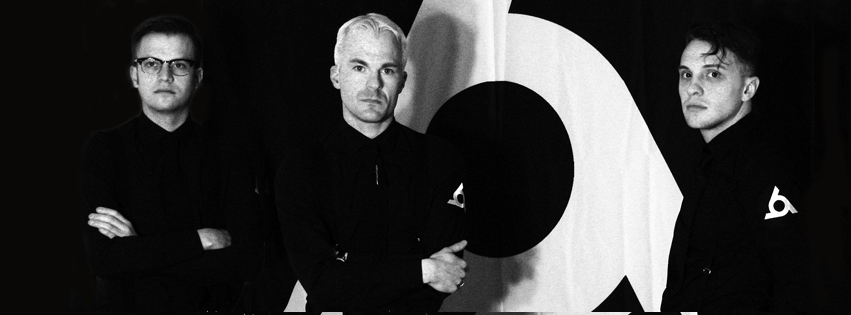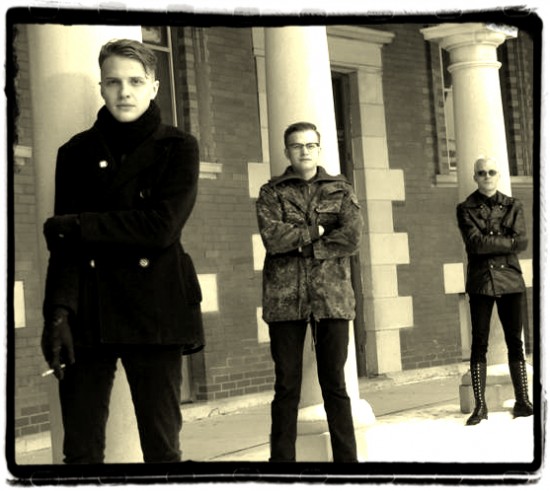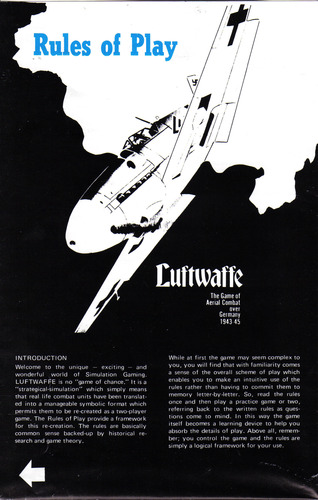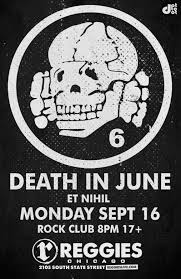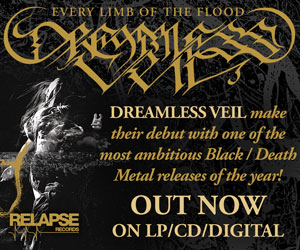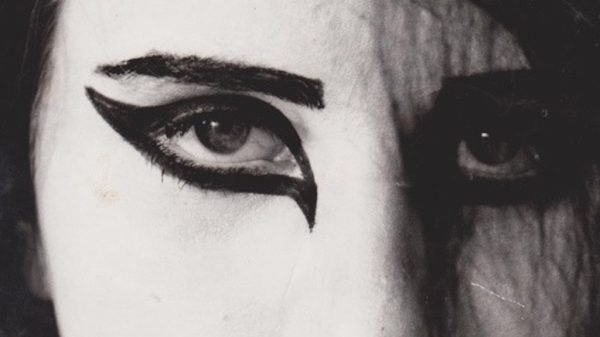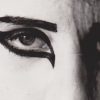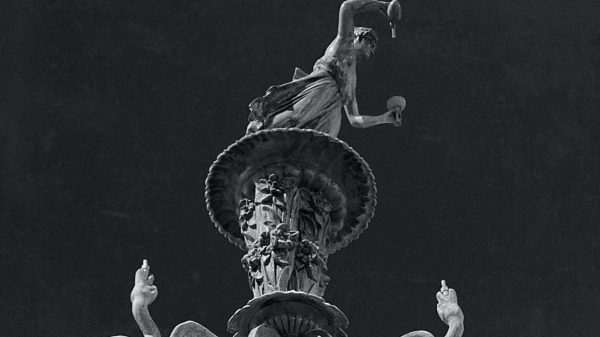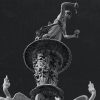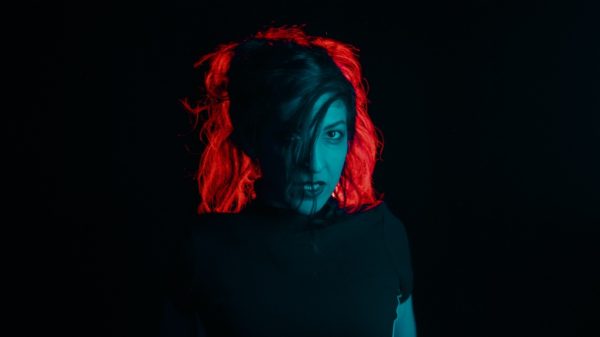Earlier neofolk was sometimes called “apocalyptic folk,” a phrase seen on at least one early Current 93 flyer that seemed to sum up early bands’ stripped down, back-to-basics acoustic approach to making doomy, and quite often occult-tinged, music(k). One of the longest-running current podcasts of this style is in fact the aptly-named “Aural Apocalypse: A Soundtrack for the Final Days” (hosted by the amazing Merrick Testerman, it should be noted).
The early grand trifecta of neofolk was Death in June, Current 93, and Sol Invictus, and those 3 bands had members circulating between them quite often. One of the few American bands that carries forward in that early, dark, postpunk, and guitar-strumming vein is Chicago’s Et Nihil. It’s been mentioned elsewhere that they are one band that put the apocalyptic rightfully back into the “apocalyptic folk” genre tag. Their debut LP, ONUS, is evidence of that fact.
Et Nihil were interviewed by Oliver in November, 2013.
Oliver: Let’s get started simple and work our way towards the deeper stuff! First: For folks who might be reading about your Neofolk project, ET NIHIL, for the first time, can you give us a rundown of the personnel, the history, and the location of the band?


Ben (b9 InViD): Since 1997 I was in the Neofolk/Martial duet Luftwaffe. After our dissolution in January of 2013, I worked to rapidly redefine my art and was fortunate to have two excellent musicians in my midst. I met Spencer Smith (bass/vox/guitar) at a Cult of Youth concert some years ago. He’d been influenced by the Luftwaffe material and after the break up I invited him to be a live performer in the upcoming concert in Germany. He agreed and referred me to a path which led to my meeting Jonathan S., who is now our principal percussionist. Inordinately skilled, Jon also plays in a Black Metal group called Vlk. We are based in Chicago.
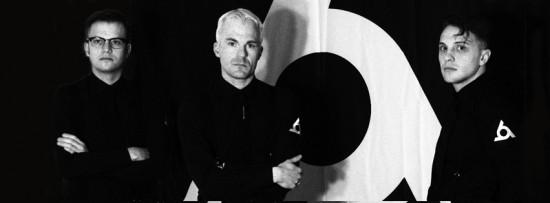

Oliver: Your former band, Luftwaffe, came out with a posthumous LP, “Dissension.” To me, it sounded like a mix of experimental industrial (on, say, one track), and purist Neofolk (on, say, another). Can you tell us why the end result of the LP had so many songs that seemed to draw from so many seemingly disparate influences, and encompassed a variety of sounds?
Ben: With events leading up to Luftwaffe’s dissolution, duet-music-sessions were not possible near the end. Much of my latter composition was drawn from existent musical-fragments and this led to a less cohesive album, thematically. Perhaps the lack of cohesion spoke to the ending which was imminent. In a broader sense, I like each song I write to be dramatically different than the last. This keeps being a songwriter self-indulgently exciting.
Oliver: Speaking of Luftwaffe, is there anything you would like to share about that band’s break up and how and why it came about, and what relation the Dissension LP has to that period of time? Was “Dissension” a name you had decided on before or did it end up having a kind of strange significance, given what happened to your former band?
Ben: The end of Luftwaffe was resultant from long-diverging directions, which were ultimately incompatible. The final album was not easy to finish, due to the times in which I was completing it. Dissension is the title of my 2006 cover photograph. While not intended as such when it was conceived long before, it may bear a certain irony now.
From 1991-93 I attended a weekly RPG group. Occasionally we would play a vintage game and one was a hex-map air combat simulator called “Luftwaffe.” The name (and cover art) fascinated me and I read about its pronunciation and literal meaning: “the sky, armed.” The very ether as a weapon. I vowed then that I would eventually start a band with that name and it is still strange that I did, and now it has run its course.
Oliver: Why did you choose the name “ET NIHIL” for your new band? What does that signify to you, and what should it mean to the lay reader — I mean, “lay listener” (hah)?
Ben: ET NIHIL is drawn from my lyrical refrain in the Luftwaffe track, “Bled White.” It literally means “and nothing,” which to me is the great nihilist-conclusion to all things. As Latin is a dead language, my personal phonetic-pronunciation of my band moniker is “ET NEE-hil.” I debated on several new band names, consulting some friends as to their thoughts, but this was the best fit in terms of my purview.
Oliver: The “logo” of ET NIHIL seems to be a three-spoked circle, or maybe even a three-sided lower case b. What does the ET NIHIL logo mean to you?
Ben: While the sigil may appear to be a combination of other icons, it is its own independent symbol. I did not create it, and it is drawn from a Far Eastern entity which no longer exists. In its original context it stands for many things: indoctrination, power, efficacy…the onus to fight forward for something greater. The onus was mine this year to forge onward as an artist from scratch with a new moniker and new musicians. I have and I am more successful now than ever. I refer to my sigil as the Sigilis Onerous, or simply The Onus.
Oliver: Many reviewers have noted that if there is a band that carries the torch forward of specifically APOCALYPTIC Neofolk, it is you and your project(s) (Luftwaffe and ET NIHIL). In fact, one of the things I’ve liked about your music is that it always has an air of menace, doom, and impending conflict — the “war” drums, the dissonant trumpets, and the stern and martial vocals. Let’s compare this to many contemporary Neofolk bands, who have lately concentrated on “darkly romantic” songs. ET NIHIL seems, by contrast, to paint a picture of impending disaster through the music’s atmosphere versus one of romantic sentimentality, as one finds increasingly in Neofolk. Is this intentional, and what are your thoughts on “apocalyptic folk” versus the more “world music” Neofolk one seems to hear more and more of these days?
Ben: My work, lyrically and compositionally is observing and reporting on the progression toward the inevitable end. The world-music aspect of the genre seems to draw largely from the past and the times from whence all originated. I don’t see the future as bright, yet mine is an uncontrollable need to speak to its dim advent in all of its facets.
Oliver: The ET NIHIL “Onus” CD, to me, has a very foreboding and ominous sound to it. It doesn’t sound like a celebration;; it sounds like some sort of cross between a dirge and music meant to gear people up for war. What were your intentions when crafting the music on the “Onus” EP?
Ben: ET NIHIL was born of difficult times. It was resilience out of a certain despondency that led to the new direction the music has taken.
Oliver: You and I have discussed briefly what “American neofolk,” per se, actually is, or could be. I’ve also had this same discussion with Greg of Dying and Rising. You see some European neofolk bands don traditional dress from their countries’ ethnic past. In America, though, what would that mean — coming on stage with coonskin caps, dressed like Davy Crockett, strumming guitars? Wearing powdered wigs, knee-length breeches, and tri-corn hats while coming on stage pounding on floor toms, like right-wing Tea Partiers trying to be hip? What is American neofolk to you, and what should it be?
Ben: While I love the work of many bands who explore traditionalism and heritage in their music and presentations, they are rarely themes in my own art. I did record a track for the Triskele compilation Manifest Destiny (a reference to a root of Americanism), but I took some liberty there. The aesthetics we employ as ET NIHIL are not ones of anachronism or nostalgia but rather defining that which is forthcoming. We herald an ordered progression in the end of all things.
It would, however, be novel to see an American Neofolk act play in the garb of Natty Bumppo and The Leatherstocking Tales.
Oliver: The songs on Onus are a brilliant collection of dirge-y, menacing, tragic, and militaristic numbers — at once reminding me of Strength Through Joy and even some acts like Cawatana or Die Weisse Rose. Who are your musical inspirations and what were you trying to set out, sound-wise, with this new LP?
Ben: Thank you. I set out with no expectations nor plan in terms of the sound for ET NIHIL. The first track I recorded as such was Scry, and some mentioned it having a similar flavor to some of my guitar-work in Luftwaffe. Moreover, many of the songs on the final Luftwaffe album I consider the beginning of ET NIHIL, as I did them largely on my own. My recent live and recorded work with Axel Menz (Hekate), Benjamin Sperling (Jännerwein), Katrin X and Erin Powell (Awen, interviewed earlier at CVLT Nation HERE) has been very inspiring for me. I look forward to more!
Oliver: Is there a political agenda behind the band? What is it, if there is one?
Ben: My art is not political.
Oliver: Back to your most recent release, the “Agony” track on the recent “Onus” LP — where did you get those horrific, pained/wailing samples and what did you intend to communicate or express by employing those in that track? Again, to me, it sort of puts the “apocalyptic” back in the “apocalyptic folk” genre tag.
Ben: Many of my songs have an autobiographical basis. Agony was composed this past summer, during which I endured a severe emotional trauma, feeling as if my own end was near. When I employ the sounds of suffering in my music, it is important that they are genuine. In this instance, anything less would have been deceitful.
Oliver: You and I talked about Neofolk’s roots when you were in Dallas. Namely, I thought it all being lumped under this “post-industrial” heading was a little off the mark. One of the granddads of Neofolk, Death in June, essentially started as a Joy Division-esque postpunk band, and then unplugged their instruments for an acoustic sound to continue making gloomy music. That, to me, makes most neofolk a “post-post-punk” phenomenon. I understand the confluence with Psychic TV and Current 93 (whose “industrial” standing still baffles me a bit , given that I think they are also a part of a broader post-punk phenomenon), and the personalities involved with them. What do you think Neofolk is, musically? What is your own personal taxonomy and understanding of this music as it all fits together?
Ben: My own music, which incorporates acoustic instruments, is rarely traditional folk music. The word Neofolk, despite its linguistic components has become a new and independent term. I see the unifying aspects of Neofolk to be intellectual, aesthetically-elegant and uniform approaches to the misanthropy and disdain for that which is—whether in exploring the past or forcing the future’s fruition.
Oliver: The track on your new Onus LP, “The May Report” especially seems to employ the use of your acoustic guitar. How did you learn to play it, and do you feel the acoustic guitar is an integral element of ET NIHIL’s sound? (I ask this because I am an incurable fan of the guitar, apparently.)
Ben: My late-father was a luthier as a hobby, making dulcimers and bowed psalteries and there were always acoustic instruments around. I played acoustic guitar some in my youth, but was not sure until much later how to implement it vis-à-vis the aggressive music I wanted to make. My father also taught me an appreciation for antiquity and the sound of old-wood. My own guitars are 1970s vintage and I feel a ritual connection to one’s instrument is paramount. Hence why I lug my guitar thousands of miles versus using a loaner-instrument, with which I could never be content.
Nicholas Tesluk of Changes and I share this mindset (he has a vintage Gibson) and he even created a list of airliners which will or will not accommodate his guitar in the overhead. We never check our guitars and this is why: http://gawker.com/5973747/delta-prevents-musician-from-bringing-vintage-gibson-guitar-on-board-ends-up-destroying-it
Oliver: A favorite question of mine to ask musicians: If you were stranded on a desert island, and had only 5 LPs to listen to for the rest of your life, assuming BY SOME CRAZY AND COMPLETELY IMPLAUSIBLE REASON that the technology was there for a vinyl record player and nothing else, what would those 5 LPs be, and why?
Ben:
Jackie Gleason — For Lovers Only, I have sentimental associations. Makes me cry every time.
Death in June — But What Ends When the Symbols Shatter? (see below)
Throbbing Gristle — Mission of Dead Souls. My favorite live album.
The Cramps — Smell of Female. My second-favorite live album
Boyd Rice and Friends — Music, Martinis and Misanthropy. Very life affirming!
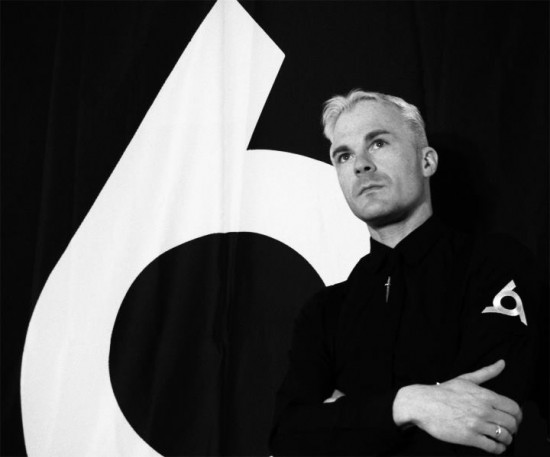

Oliver: You were recently able to open for Death in June in Chicago and have played with them before. What influence has Death in June had on your songwriting and how has Douglas P, John Murphy, et. al., been when you have seen them?
Ben: The Death in June, Strength Through Joy, and NON concert I saw in 1997 changed my musical direction completely. I honed my guitar and vocal skills listening to But What Ends When the Symbols Shatter? and Salute to Light, repeatedly. I have had the privilege of performing with Douglas and John on three occasions now, the most recent as ET NIHIL in Chicago. My only regret was that our time together in Chicago was so brief. Without Douglas’ influence and camaraderie, I have no idea what I would be doing today musically.
Oliver: Do you believe in trepanation (opening the skull to cure maladies of the brain or to let evil spirits out), and why so? Wasn’t the old Luftwaffe logo a trepanation symbol?
Ben: There is a great documentary called (not surprisingly) A Hole in the Head which discusses the history of and current trepanation movement and has interviews with many modern intellectuals who have upped their brainbloodvolume through the procedure, including the late Bart Huges. They make a convincing argument for the procedure.
Personally, Luftwaffe was and is only about the music. The symbol we used has lost any meaning to me.
Oliver: Your latest release, the “Onus” LP, is out on Old Europa cafe. They seem to be a great champion of music in this vein. What is coming up for ET NIHIL and where can fans go to listen to more stuff and to buy ET NIHIL merch?
Ben: Old Europa Café has been a great label with whom to work, and I hope to have another ET NIHIL release with them in 2014! Currently we are recording a limited, handmade EP box set to be self-released on vinyl just after the first of the year.
Also, a very handsome 4 LP box set of our live concert at the superlative MORITURI DE SALUTANT festival in Frankfurt, Germany with Sonne Hagal and Awen will be released right around the time of the 2014 Wave Gotik Treffen. Our hosts showed us such a wonderful time! Footage from our concerts and other ET NIHIL tracks are on Youtube and are posted in our Facebook fanpage. More merch forthcoming soon:
http://www.facebook.com/etnihilest
Oliver: Anything else you would like to add or plug or elaborate on that you didn’t get a chance to yet?
Ben: My heartfelt thanks to all of those who have been instrumental in making ET NIHIL’s first year of existence so brilliant.


